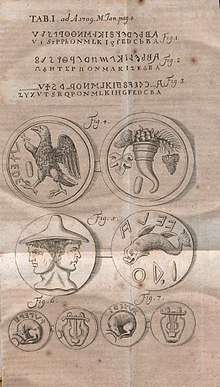Giusto Fontanini
Giusto Fontanini (San Daniele del Friuli, October 30, 1666 – Rome, April 17, 1736) was a Roman Catholic archbishop[1] and an Italian historian.[2]
Biography

A prelate and attentive bibliofilo, in 1697 became a stubborn defender of the Papal Curia, with a reactionary position.
In 1708 he was the protagonist of a strong controversy between the Holy See and the Este o d'Este (just returned to Modena) for the possession of Comacchio. Comacchio was a territory that the Church joined in 1598 together with the Duchy of Ferrara, and now Giuseppe I occupied it by claiming it to the Empire and the House of Este. The juridical conflict that arose there was very heated, especially by Fontanini who defended the position of the Holy See and did not spare offense to priest Ludovico Antonio Muratori, his opponent as a lawyer of the Estensi. This controversy was detailed in the full exposition of imperial and extant rights over the town of Comacchio (1712) of the Muratori. In response to Fontanini's objections, Muratori published the first Antiquitates Italicae and Antiquities estates, claiming the ancient origins of the house.
With free access to Vatican papers, he relied on countless texts and composed many erudite works such as "De antiquitatibus Hortae coloniae Etruscorum" (1708), "Dissertatio de corona ferrea langobardorum, masnades" and several others.
His most important work is the "Library of Italian Eloquence" (1726), a bibliography of the letters, later corrected and supplemented by Apostle Zeno, historian and poet (1753). The importance of this project is highlighted in the subtitle: Where are neatly arranged works printed in our vulgar language over the disciplines and the main subjects. A classification of knowledge, then, but with a revolutionary linguistic plan: the vulgar, now national language. The disciplines in which he shares his library of eloquence are: grammar, rhetoric, poetry, dramatic (theater), lyricism, history, philosophy, theology. There are, and legitimate, both vulgar works and the vulgarizations of ancient works.
Sharp criticism by the intellectuals of the time for the many omissions and inaccuracies does not diminish the value of this Library, which is recognized as the first step in the arrangement of Italian works.
The great importance of the collected historical material is perhaps the greatest testimony of what Giusto Fontanini is recognized as one of the most significant exponents of the scholars and intellectuals of his time.
References
- ↑ David Cheney, Giusto Fontanini, su Catholic-Hierarchy.org.
- ↑ Dario Busolini, FONTANINI, Giusto, in Dizionario biografico degli italiani, vol. 48, Roma, Istituto dell'Enciclopedia Italiana, 1997.